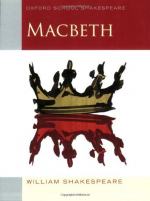|
This section contains 2,001 words (approx. 7 pages at 300 words per page) |

|
The Symbolism and Irony of Macbeth
Summary: Explores symbolism and irony used in the William Shakespeare play, Macbeth.
There are only a few plays where most critics will consider the same theme. One may think that Macbeth is written on the idea that the nature of man and man's universe are so constructed that a man cannot play with evil and remain unwounded and victorious in this world. More directly, in the words of G.R. Elliot, it is that a "wicked intention must in the end produce wicked action unless it is not merely revoked by the protagonist's better feelings, but entirely eradicated by his inmost will, aided by Divine grace." The theme is forced by the shortness of the play, the unvaried style, recurrent images, sleeplessness, blood, darkness and by physical actions, such as sleepwalking(Macbeth)
The main source of Macbeth is Raphael Holinshed's Chronicles. Shakespeare combines the rebellion of Macdonwald and the invasion of the King of Norway, Sweno. He uses Holinshed's point...
|
This section contains 2,001 words (approx. 7 pages at 300 words per page) |

|


